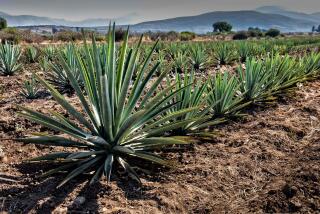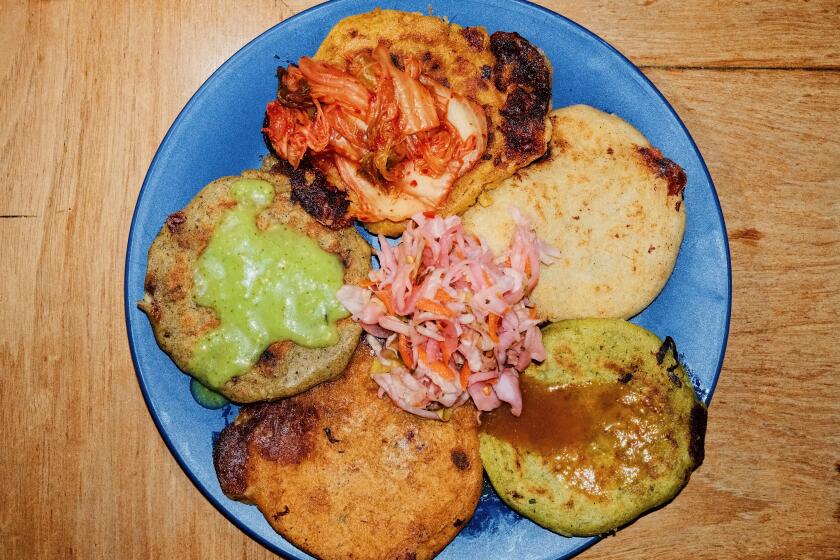Poor Man’s Tequila Finding Market Outside Mexico
OAXACA, Mexico — A potent and earthy Mexican liquor is hitting the export trail, but beware: Even locals take it with more than a pinch of salt.
Mezcal, tequila’s wayward half-brother, is a smoky-tasting cactus distillate that boasts like a badge of honor a caterpillar-like worm floating in its depths. Long lost in tequila’s shadow, mezcal had for centuries been the socially frowned-on drink of Mexican peasants, helping them endure a miserable existence in dirt-poor southern states like Oaxaca.
Until recently its contact with the outside world was best described as notorious. Visitors to Mexico often found it the sort of drink that tasted good once but when taken home tended to sit untouched at the back of the liquor cabinet.
On Mexico’s “hippie trail” to the marijuana-fogged beaches of Oaxaca state, a cheap night of “mezcal madness” was part of the fun but fearsome hangovers meant it was rarely repeated.
Curiously, that same drink is now developing a cachet all its own in connoisseur drinking dens as far afield as New York, London and Taiwan.
“A Taiwanese businessman ordered 50 cases, but he asked me specifically not to include the worms,” Porfirio Chagoya, a third-generation mezcal manufacturer, said. “I slipped in five cases with a worm in each bottle. The next time he called me, he said: ‘I’ll take 50 more please, but this time with the worms--three per bottle.’ ”
In the town of Matatlan, 40 miles south of Oaxaca, plumes of steam hang over farmyard distilleries where mezcal is made in a manner that has hardly changed for centuries. Mule-driven grindstones crush the roasted cactus hearts to a sweet pulp that is left in wooden vats for days to ferment.
Then the fermented liquid is shoveled into a wood-fired oven and distilled twice. There is no use of thermometers or any other type of quality control, just family wisdom handed down from generation to generation.
“I first started making it as a boy and I have drunk it all my life,” 77-year-old Isaac Jimenez said, speaking in Spanish but breaking into the Zapotec Indian language to chat with his son about the distillation process.
“Mezcal is good,” he said, stressing the last word.
Drinkers seem to agree. Promoters claim among the reasons for its success is a revival of live-fast machismo in which drinkers revel in strong alcohol as a symbol of virility--an image to which mezcal’s mysterious powers are well suited.
Pointing to these supposed qualities, Chagoya, who described mezcal as “the perfect thing for a honeymoon,” said his grandfather, who used to put away at least a glass a day, fathered his last child at the age of 65.
Workmen in Oaxaca carry a bottle in their back pockets to give them strength, while the elderly, including women, say a couple of glasses a day keeps them on their feet.
Leading the charge abroad is high-grade mezcal, made 100% from the maguey cactus plant. Exports from Oaxaca, where most mezcal is made, have almost doubled in two years to about 475,500 gallons (1.8 million liters) last year, the industry says.
Safeguarding profitability, the government said in late February it had won denomination of origin protection for Mexican-produced mezcal and tequila in the European Union.
But despite its growing following abroad, exporters admit the industry is in crisis. Battle lines have formed between those who want to gear up to international standards and old-style peasant producers who fear they will be squeezed out by big business.
Stiff competition from synthetic--hence cheaper--mezcal aimed at the low-income local market has sent the number of small distilleries plunging from 1,200 in the 1980s to 300.
Other hazards lurk. Taking a swig from an unknown bottle of mezcal in Oaxaca can still be a risky business. Some unscrupulous manufacturers resort to synthetic spirits to cheapen the lengthy production process, which has been made more expensive by a shortage of maguey and a dearth of credit.
The results can be fatal. In 1994, 28 people died in the southern Mexican state of Morelos from mezcal tainted with methanol.
More to Read
Eat your way across L.A.
Get our weekly Tasting Notes newsletter for reviews, news and more.
You may occasionally receive promotional content from the Los Angeles Times.










